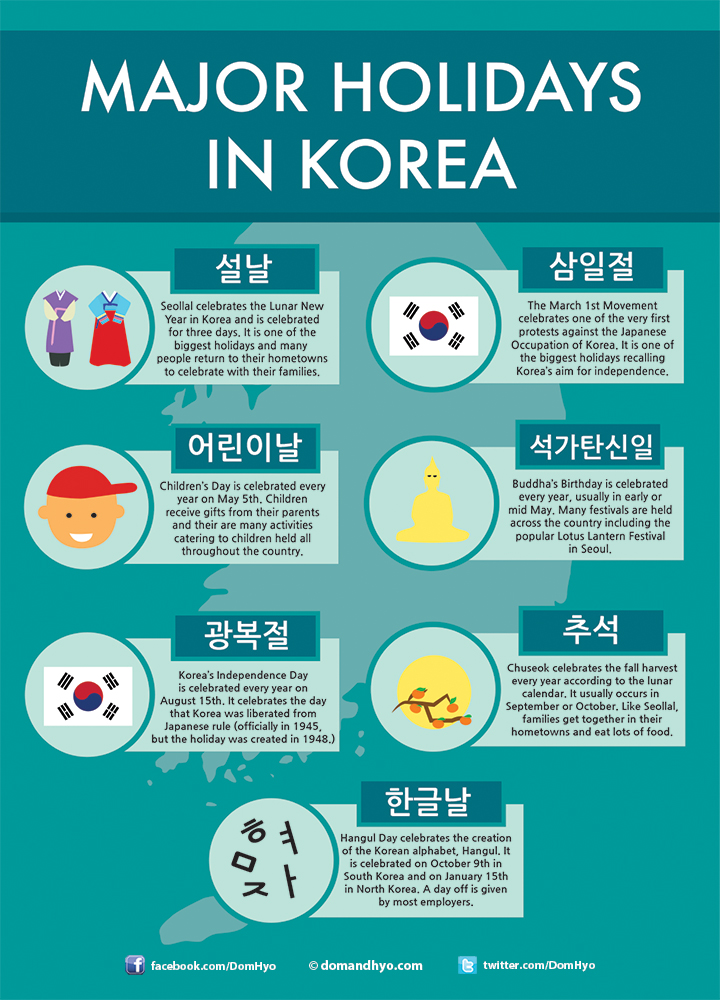
Just like other countries across the world, South Korea has its own holidays and traditions. Some of you may already be familiar with a few of them, but there are probably some that you are not quite familiar with yet. No problem. We will introduce you to the holidays Koreans celebrate here in this article. The infographic above offers a brief synopsis of the 7 biggest holidays, but we will tell you about some others that are widely celebrated. With that, let’s get started!
Korean Holidays in January and February
#1. 설날 ( Seollal)
We’ve merged January and February for the simple fact that the biggest holiday in Korea, 설날 (seol-lal), can fall in either month depending on the moon cycle. This holiday is celebrated all across Asia and is known as the Lunar New Year since it’s based on the last moon cycle.

Food and Gift Giving
This is a pretty big holiday in Korea, and while the official holiday is three days, in some years, people can get a total of five days off from work if the holiday falls close to the weekend. During this time, families all around the country travel to see one another and eat lots of delicious food including things like ddeokguk, ddeok, songpyeon, manduguk, japchae, galbijjim, and bulgogi. Much like Chuseok, the whole day is spent preparing food.
In addition to the delicious food, gift giving is a big part of the holiday. This is especially true for children who will perform a bow, called 세배 (se-bae) to their elders to receive a nice sum of money which is called 세뱃돈 (se-baet-don). Whenever I come back to school from the long holiday, my students would always be excited to tell me how much money they got from their parents and grandparents. I imagine for them, something like 100,000 KRW (around $100) makes them feel rich. The adults will also bring gifts and money to their parents and in laws. Common gifts include fruit baskets, toiletries, expensive meat, and ginseng.
Ancestral Rites
Ancestral rites called 차례 (cha-rye) are carried out by many families, although not everyone does it or feels obligated to do so. It depends on the family. In this tradition, all the food that has been cooked will be set on a large table and everyone will gather and do deep bows to pay respect to family members who have passed on. The amount and variety of food can be quite a lot and once the rites have been done, the food is then shared between everyone.
Games
Finally, you have the games. Some games that are traditionally played on Seollal are yutnori, yeonnalgi (flying kites), neolttwigi (see-saw game), paengichigi (spinning a top), and jegichagi (tossing a bean bag).
Check out our infographic on Seollal.
#2. New Year’s Day
Yes, the new year is celebrated twice in Korea! Just like the rest of the world, Koreans celebrate the New Year on January 1st. Unlike Seollal, the celebrations are a bit more loose and free and has a party vibe to it. Many people will go out on New Year’s Eve and party it up with friends, go out for dinner, attend festivals, see the sunrise on the east coast, date, or just relax at home with friends and family. If you’re in Korea during this time, you’re bound to find something to do.
Korean Holidays In March
#3. 삼일절 (March 1st Movement)
While the month of March doesn’t have many holidays, it has one important one. That holiday is called the March 1st Movement and it celebrates one Korea’s earliest resistance to Japan’s occupation of the peninsula. The movement occurred on March 1st, 1919 and the holiday celebrating these demonstrations was made in 1949. Every year, Koreans remember this day by going to special events across the country. If you’re in Seoul, you should visit the Seodaemun Prison History Hall to get an extensive background on the brave people who fought for Korea’s independence during this time.
Korean Holidays in April
#4. National Assembly Election Day
April in Korea typically has no holidays except for every 4 years for the election of officials to the National Assembly. It will typically happen during the second or third week of April on a Wednesday. This holiday will not get you time off, but if you’re a citizen, you can exercise your right to vote and have your voice heard in the election process.
Korean Holidays in May
May brings with it a slew of holidays and many Koreans look forward to the month of May because aside from Chuseok and Seollal, it’s the only other time where you can get a series of days off in a row.
#5. 근로자의 날 (Labor Day)
At the beginning of May, it starts off with Labor Day on May 1st. If one is lucky, they may get the day off, but this day is usually reserved as a day off for contract workers only. If it falls on the weekend, most bosses will give that Friday off for a long weekend. There are no big celebrations on this holiday since other bigger holidays come the week after. People will use the time off to enjoy time with their friends and family and just enjoy some personal time.
#6. 석가탄신일 (Buddha’s Birthday)
The next holiday up is Buddha’s Birthday. Now although this holiday typically falls in May, there are rare occasions when it will fall in the last few days of April. This is a holiday celebrated all throughout Asia. It’s one of my favorite holidays here in Korea, because the celebrations are colorful and really puts you in the springtime mood. You will see colorful lanterns hanging all throughout cities and parks and you can find many celebrations and parades, many of which start about a week in advance of the actual holiday.
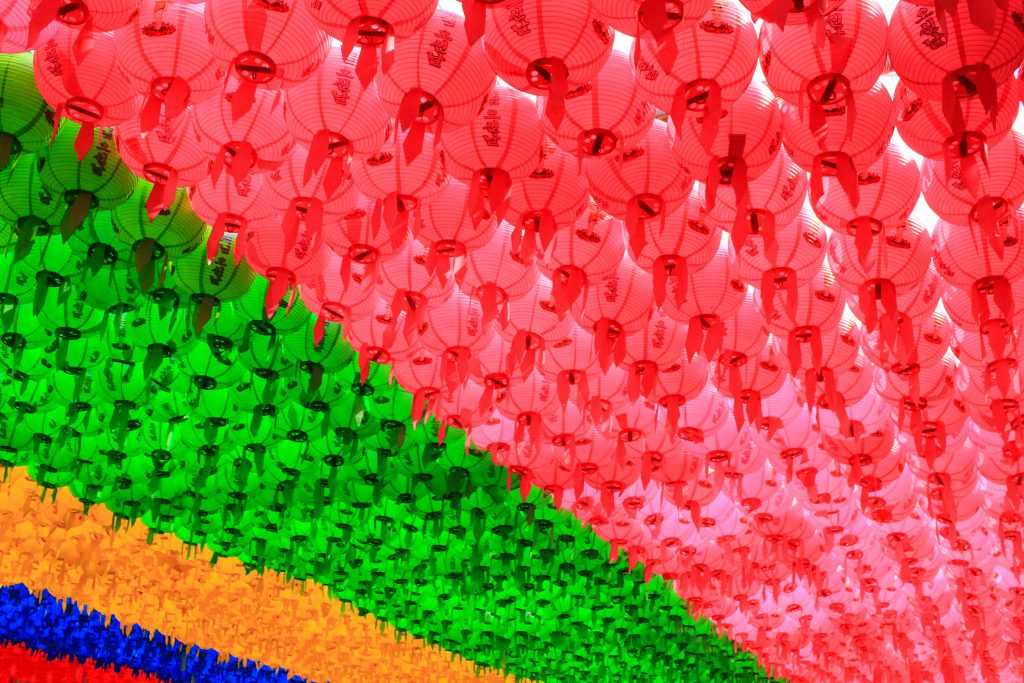
If you head out to some of the Buddhist temples, you will find colorful lanterns and other decorations as well as some sampling of the food that the monks eat during their time at the temples. The major festival that happens during this period is the Lotus Lantern Festival where Buddhist monks join in with everyone with a large parade filled with lanterns and floats of dragons lit up from the inside. Many cities across the country will have festivals like these.
#7. 어린이 날 (Children’s Day)
The next holiday up in May is Children’s Day. It falls on May 5th and just by looking at the name, you can tell this is a holiday that children in Korea look forward to. There will usually be lots of events and activities just for kids all around the country. Not only that, but parents will give their children gifts and money to celebrate the holiday. It’s even better for the children if the holiday is on a Monday or Friday as it guarantees a long weekend for them to enjoy and have fun. This counts as a public holiday, so most work places give their workers the day off.
#8. 어버이 날 (Parent’s Day)
It’s only fitting that parents get their own holiday as well right? The only downside is that Parent’s Day is not a public holiday which means no day off. It falls on May 8th and is celebrated by giving parents gifts and for the older adults, taking their parents out for fancy meals and giving them flowers. Many parents look forward to this day as a day when their children show them appreciation and thanks.
#9. 스승의 날 (Teacher’s Day)
Originating in 1963, this holiday was made to show respect and appreciation for teachers. It falls on May 15th, and it’s not a public holiday, so no day is given off. It just counts as a national holiday. It’s usually celebrated by students giving various small gifts with the traditional gift being a carnation. Although it has been celebrated for quite some time, each year it seems to have less and less importance as certain rules have been made to make sure students aren’t bribing teachers with expensive gifts for favors and better grades.
Korean Holidays in June
#10. 현충일 ( Memorial Day)
The one and only holiday in June is Memorial Day which falls on June 6th. It counts as a public holiday with days off for most workers, so you can see why many people in Korea look forward to the months of May and June. This holiday celebrates the lives of the men and women who have died during military service. A big ceremony is held at the Seoul National Cemetery and in the morning at 10 am, sirens sound off as some people hold silent prayers for the fallen.
Korean Holidays in July
#11. 제헌절 (Constitution Day)
With summer in full swing, the only holiday in July for Korea is Constitution Day. It is observed on July 17th and commemorates the creation of the constitution for the country. On this day, a celebration is held in front of the National Assembly Building (where laws are passed) with major officials in government including the president in attendance. Other events across the country at schools related to law making as they relate to the lives of school children.
Korean Holidays in August
#12. 광복절 (National Liberation Day)
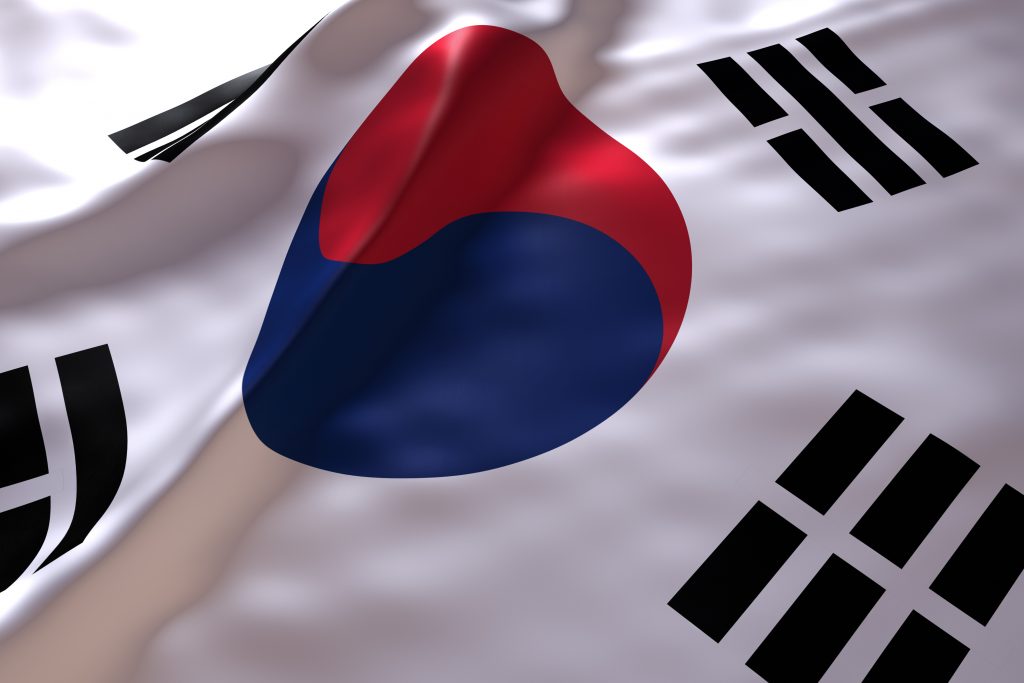
Historically, this is probably the most important day for Koreans. This is the day when the peninsula was finally free from the occupation of Japan as World War 2 ended and Japan surrendered. It’s basically the independence day for Korea and recognizes all the sacrifice and struggle for years under the Japanese occupation. This is day annually celebrated on August 15th and is also celebrated by North Korea as well. This is a public holiday with workers getting the day off.
During this time, you will see Korean flags everywhere. Even in areas inn cities where many countries’ flags are flown, you will see them all taken down and replaced with the Korean flag in preparation for the holiday.
There will also be an official ceremony held by the government along with the singing of the official song for this day. People who are descendants of activists who fought for Korean independence can also ride public transportation for free as well as enter museums for free on this day.
Korean Holidays in September and October
#13. 추석 (Chuseok)
Like the months of January and February, we’ve combined the months of September and October because another big holiday, Chuseok, can fall in either one depending of the timing of the harvest moon. This holiday is the equivalent of American Thanksgiving, and in terms of food and family gatherings, it’s just as big as Seollal. Depending on the day of the holiday, a five day weekend could be in store for many people.
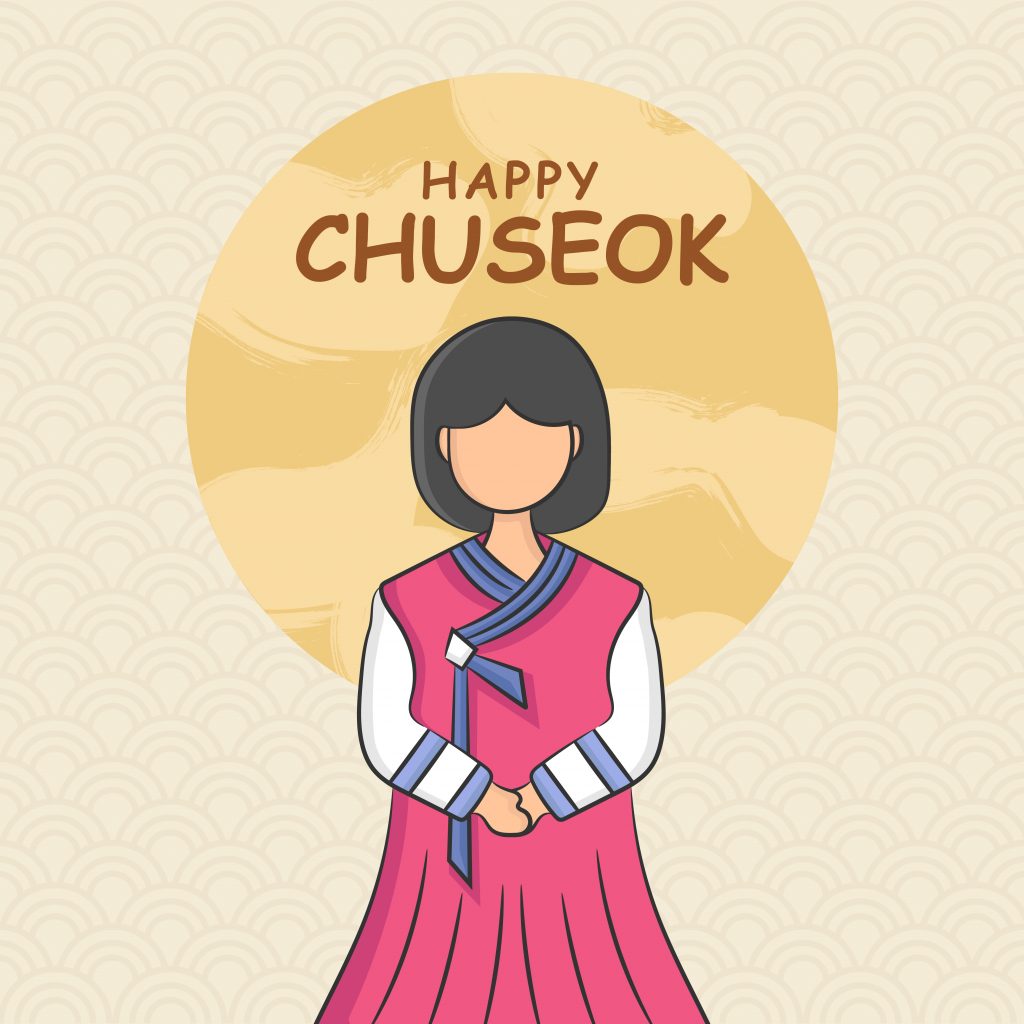
People will go all over the country to visit their relatives and people usually need to buy train and bus tickets months in advance before they sell out.
Like Seollal, ancestral rites called 차례 are performed by many families as they visit their hometowns across the country. When they visit the graves of their ancestors, they will leave food at the gravesite and perform the rites as well as clean the area around the graves. Similar gifts given at Seollal are also given during this time as well.
Some common games played during Chuseok include Go Stop (a Korean card game), Ssireum (a type of wrestling), and Juldarigi (tug of war).
#14. 국군의날 (Armed Forces Day)
This National Holiday falls on October 1st and commemorates the service of the men and women currently in the armed forces in the country. Small observances are usually held with the military sometimes displaying new weapons and vehicles during special ceremonies.
#15. 개천절 (National Foundation Day)
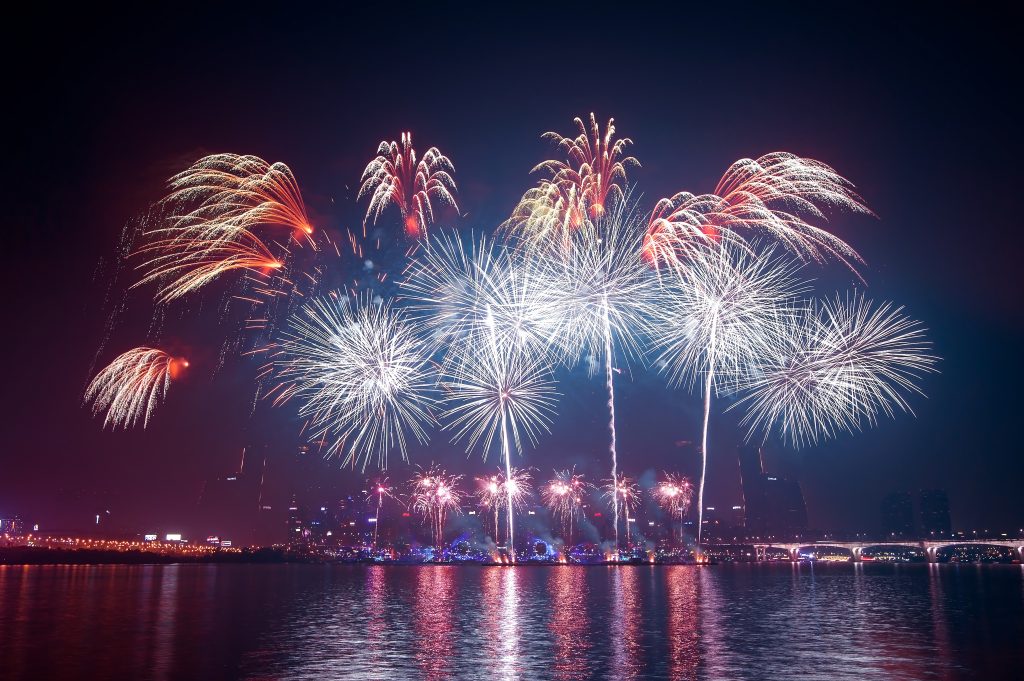
This holiday which falls on October 3rd, celebrates the creation of the first Korean state, Gojoeson in 2333 BC. This holiday is also recognized in North Korea. Many celebrations take place all over the country, with the biggest being fireworks displays. If you’re prepared to deal with the crowds of people, the fireworks show on the Han River in Seoul is a great way to spend the later part of the day off. If the holiday is on a Friday or Monday, many Koreans celebrate by taking a nice weekend trip.
#16. 한글날 (Hangul Day)
The last holiday in October is Hangul Day. Like the name implies, it celebrates the creation of the Hangul alphabet by King Sejong. This holiday is celebrated on October 9th and since it’s a public holiday, most people get the day off. Although it was made into a public holiday in 1970, there was a period from 1990-2012 where it wasn’t due to the government wanting to have as many business days as possible for growth.
Since there are no real big celebrations for this holidays, this day leaves the door wide open for you to find something to do. You could take a trip, hang out with friends, or just relax at home.
Even better, you could brush up or start on your Korean learning journey 🙂
Korean Holidays in November
Sadly, there are no holidays in November. It’s one of the toughest work periods to get through as the next public holiday after Hangul Day is Christmas towards the end of the year. As someone from the states, I will usually still celebrate Thanksgiving on my own by cooking some favorite meals from home.
Korean Holidays in December
#17. 크리스마스/성탄절 ( Christmas Day)
Finally as we end the year, we get to Christmas. Just like the rest of the world, it’s celebrated on December 25th, and with around 50% of the population believing in Jesus, it’s a big holiday for many. Most people get the day off and everyone celebrates it differently.
For the religious, they will attend church gatherings and get together with their families. Others may make it a date day or hang out with their friends. Christmas wasn’t that big of a holiday in the past, but it’s becoming more and more popular and people are starting to do more special and fun things on this day. For more about Christmas and Korea, check out our post here.
And there you have it! If you’re planning on visiting Korea, it could be pretty cool to visit the country during one of these holidays. Just make sure it’s for an extended trip as many things close and you don’t want to visit and not be able to do or see anything. What’s your favorite holiday in Korea?
